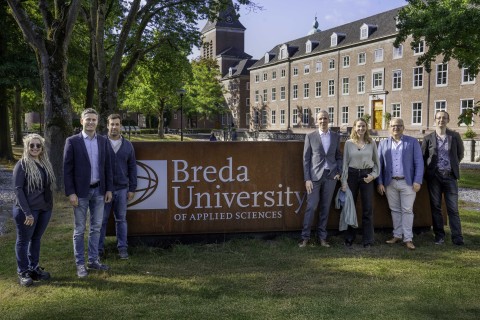- Games
- About BUas
European parliament member explores entertainment games sector at BUas
On 12 September, BUas welcomed Tom Berendsen, member of the European Parliament, for an exploration of the entertainment games sector and its educational landscape. The visit, hosted by the Academy for AI, Games & Media, provided crucial insights into one of Europe's most dynamic yet underrepresented industries.
The meeting brought together leading voices from BUas' games programme, including Patty Toledo, Manager of the Games Programme; Carlos Santos, Professor of Applied Data Science and AI; Thomas Buijtenweg, Coordinator of the Master Game Technology; and Mata Haggis-Burridge, Professor of Creative and Entertainment Games.
Educational excellence and market reality
The academy’s impressive credentials formed the foundation for discussion. Ranked the third-best game degree globally and the best among universities of applied sciences in the Netherlands, BUas’ Games degree educates approximately 800 students, over 50% of whom are international, and has partnerships with major industry players, including Unreal Engine. Remarkable results are achieved through the programme’s project-based learning approach: students have a low dropout rate compared to institutions without a selection procedure, and almost all secure employment following work placements.
Gaming in Europe has 126.5 million players - 53% of population aged between 6 and 64 - and generates more money than the music and cinema industries combines, yet the EU’s countries do not feature on lists of major global gaming development regions, in contrast to the top rankings of the US, China, Korea, and Japan.
Critical challenges
The discussions revealed significant structural barriers facing the European games industry:
- Funding gaps: The most critical challenge is a lack of start-up funding, with games requiring 1.5 to 2 years of development before they can be released onto the market.
- Infrastructure limitations: Key features for global hubs are often missing, such as the highest speeds of internet connectivity, which can prevent major studios from establishing European operations.
- Policy invisibility: The entertainment games sector suffers from a fundamental lack of recognition within European policy frameworks, often inappropriately grouped together with traditional cultural industrie or IT fieldss, despite having unique technological requirements. Games inextricably blend art, culture, and engineering, but this means they often fall into a valley between funding aimed more narrowly on these topics.
Cultural significance and research leadership
The research presented during the visit highlighted the broader importance of gaming: gaming can be a driver of inclusion, communities can predict political movements, and 25% of Europeans aged between 45 and 64 are active gamers. The academy's research portfolio includes multiple Erasmus+ initiatives, virtual production developments, and groundbreaking gender representation studies analysing over 1,000 games.
Next steps and policy impact
The meeting established concrete outcomes: Tom Berendsen committed to raising the sector's profile through written questions to the European Commission, highlighting the contradiction between the socio-economic importance of gaming and policy invisibility. The academy will work with MEP Berendsen's office to support these efforts.
Future collaboration includes attendance at the academy's annual showcase event on 29 June, attracting major European industry players, and ongoing dialogue about restructuring the Horizon Europe programme to better accommodate research and development in entertainment games.
The visit concluded with recognising BUas’s leading role in supporting entertainment video game development and R&D in the Breda region, nationally, and internationally. The meeting marks an important step in raising awareness of this vital sector within European policy, which could have a significant impact on both economic competitiveness and cultural influence in the digital age.

*f.l.t.r.: Patty Toledo, Tom Berendsen, Carlos Santos, Mata Haggis-Burridge, Anna Schröder, Jeroen Knol en Thomas Buijtenweg